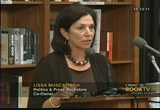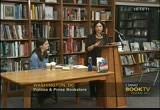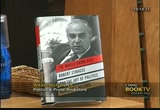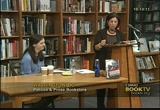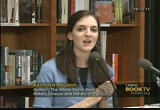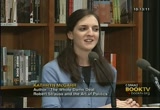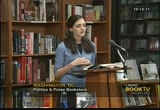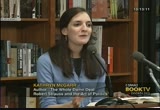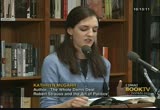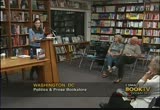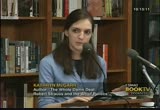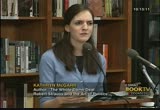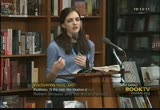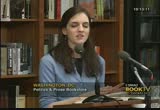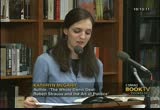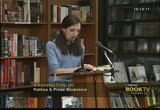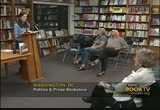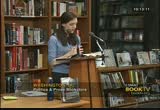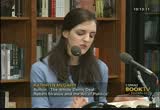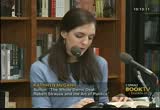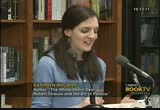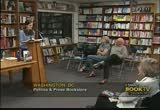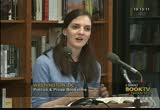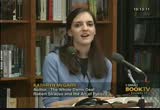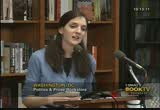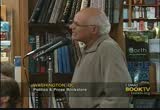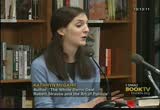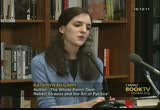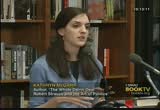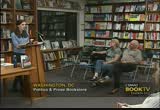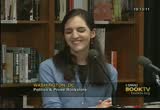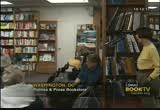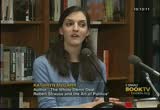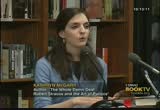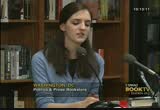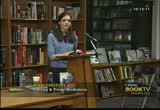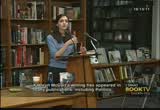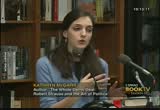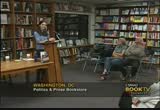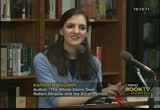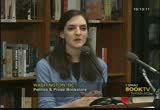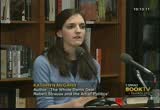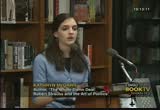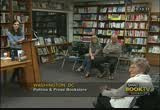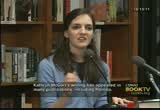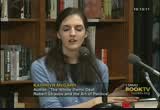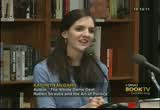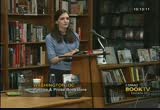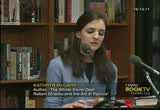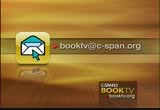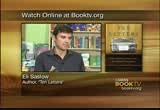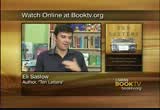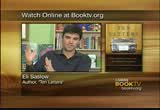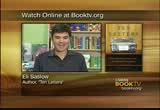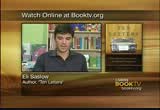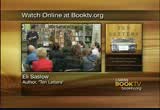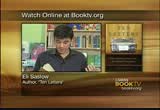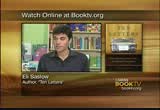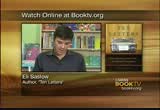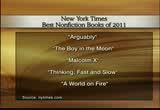tv Book TV CSPAN December 26, 2011 11:00am-12:00pm EST
11:00 am
also thank c-span for bringing this event to a wider audience. we're glad you're here. and let me just give you a few rules of the road and gave you have not been one of our events before. our guest will speak, and after that she will take questions. if you could go national we'll have one microphone tonight right here. please say your name as a courtesy, and ask your question that you answer your questions for about 20 minutes or a half hour or so but after that she will sign books. you can come up your and she sign going in this direction. ..
11:01 am
article we weigh the -- well, i'm not sure how i am supposed to describe bob strauss is in this book there is a whole catalogue of things he did not like to be called. he was not a lobbyist. he was not a fixer. he was not an influence peddler, but i suspect that he would agree and probably take great pleasure in being identified tonight as one of the truly great and iconic figures of american politics during the last chunk of the 20th century. many of you may know bob strauss, work for him, worked against him. many who have known him have probably been cajoled by him, certainly assaulted by him, which of course is a complement of salt. and i see no my friends there are many telling me earlier as
11:02 am
the story the night pozzi stir throughout the year. whether or not you have met him, know him innate capacity about come you'll certainly get to know him very well or better by reading this wonderful book, "the whole damn deal." through prodigious research, interviews with key players come including the protagonist and along with the very hard work necessary to read a good book, catherine has captured the man in his time and at least in my case, reminded readers how much our political life in our political discourse has changed since bob strauss' heyday. and i think some of us who have lived through that era and say isn't there some thing missing the states? may be a lot. so i really am delighted to welcome a first-time author, catherine the car. she'll tell us a story of how this came to be in a lot more about her famous great-uncle.
11:03 am
thank you so much for being here. he saw me welcome catherine. [applause] >> thank you, lissa and everyone at politics & prose and c-span. thank you all for being here. so lissa muscatine and i were talking about how do you read a book about your famous great-uncle and remain in the family and also write an accurate vote. the way i try to get around that was doing a lot of research, especially a presidential library at the national archives. because the uncle bob has a column in my family that i knew growing up is very different than the man in the boat. and people ask me all the time, but surprised you most about bob? what did she learn that was so surprising? i kept trying to think of some great smarty and there. and i never came up with one. but the thing that surprised me
11:04 am
most was how much power he had. he was such a powerful player in washington. when i was a child during his heyday, so i never really got to see that. and when he is at the same icon is a different person. when he's with his grandchildren it's not about him and he's not the big personality. one of his grandchildren told him they didn't even know he'd won the presidential medal of freedom until they saw it sitting on themselves and asked what it was. he was a little more modest with his own family. i didn't in my seventh grade they bought the house, which is the ambassador's residence in moscow. this is when george h.w. bush appointed bob ambassador of the soviet union at a critical time when it was trembling. bob landed there in the middle of the? when yeltsin was rallying people he went over there and he came back around christmas time and was ambassador to russia.
11:05 am
he said i think i'm the only fellow who has been fired as ambassador from 12 countries. so the uncle bob -- i did not know that uncle bob had flown into a coup. i just know he got me a cake from a seven earth day. so i began writing this book at the columbia journalism school. i took a book class with sam freedman. and i think we're bob wielded the most power and where he made one of his biggest marks in history was in keeping the democratic party together from 1972 to 1976. i was in the party was torn apart starting in 1968 after the debacle of the 1968 chicago convention and the assassination of jfk and martin luther king and the party was splintering over vietnam in a number of issues. and he came in and really help the party together, first as
11:06 am
treasurer of the democratic national committee and the chairman of the democratic national committee. the democratic party looks a little bit like the republican party today and that it's very fractured and there was an extreme wing starting in 72. the democrats and not the republicans have a tea party. but republicans don't have as a bob strauss figure. they are still leaderless. they are still fractured. so bob really came in at a key time. so i started researching his time at the dm the first. that was the first chapter that i wrote. i started in the middle and a selection to the chairmanship. in the national archives has some of the transcripts from the dnc meetings. the executive committee meetings. these can be some pretty tall reading material. but not when bob was chairman.
11:07 am
bob was really known around town and around the country because he did become a household name after he was chairman, which you could not say if the current chairman. he was hilarious. so is laughing at the national archives. they frown on about everything in the national archives, but they frowned upon that laughing. above is hilarious. he went about his job of keeping the party together with a sense of humor. jitteriness -- it was a very controversial election when he became a chairman. after mcgovern lost in 72, and nixon won every single state except massachusetts and the district of columbia. so you can imagine. i mean, nixon did that well. how bad of a candidate mcgovern turned out to be through no fault of its own. and this is what bob was up
11:08 am
against. i found this at the nixon library. they have recordings of the phone calls nickson mythmaking with his staff. one of the states, chuck colson, who is a pretty familiar name was calling the president. they were really tracking this dnc chairmanship election very closely, surprisingly cozy. they were talking about george mitchell he became a senator from maine. you know, at the time he was in his 30s and he couldn't compete with bob. chuck colson said about mitchell, he is from maine. he's smart, but is not a stress kind of a guy with a powerful, strong, brilliant individual. when i heard olson saying that i said what did pay him to say that? [laughter] but that was how he was viewed 33rd strauss would be the most effective guy they should care. it would probably blow up on them. and we're going to win either way. and obviously, they did not win
11:09 am
either way because the watergate scandal broke wide apart and he ended up of office. and there was no purge of the mcgovernite. even though he was coming from a more conservative place, he ended lbj and john commie democrat office. if you didn't embrace the mcgovernite's exactly come he definitely tried to appease the mcgovernite. he made sure he had with others for the black caucus in the women's caucus were trying at the time to grow, trying to expand. so he really was not just a compromiser, but a very skilled negotiator, making sure that everyone has a little bit of what he needed. and that was because he always said his goal for 1976 was to be able to deliver a party to a
11:10 am
candidate. is that i'm not going to deliver a candidate to this party. i'm delivering a party by the candidate. that is something that going on today in the republican party. they are trained to deliver a candidate to a very delivered country and divided party. he didn't know who the nominee would be in 1976. he certainly didn't think would be jimmy carter. no one thought it would b. carter. he looked past that is chairman of the dnc and really saw it as his tradition to keep his electric together. he didn't care who the nominee was or what they stood for. that was a criticism leveled throughout history that he was not an ideologue. all he cared about was getting democratic white house and he didn't care who was. turned out to be jimmy carter and it went on to become great friends. jimmy carter i don't think it's necessarily known for his sense of humor really the -- grew to
11:11 am
love bob. i interviewed him and he said he grew as close as two brothers. bob could make him laugh. bob would always consult him when he introduced them because that is how he knew bob loved you. you would make fun of his pants being too short. there's a lot of weight can make fun of jimmy carter. and he used all of them. and then carter appointed him special trade representative. s. t. r. at time and currently that is the opposite of the united states trade representative. he changed the title and ron curt is that ustr. and bob came in in a very weak cabinet position at the cabinet post. but he really used as underdogs add this to his advantage. he became known as someone who reach across the aisle and was
11:12 am
fine with republicans and democrats. for someone who started is karin washington, that would seem surprising. but i think what helped him with the democratic art itself is so split. he was almost working across and i already. any party but as george wallace, who ran for president many times and barbara jordan, black congresswoman and the same party. and he was very from the oath of them. anyone can do that can work across the aisle in congress for republicans and democrats and carter saw that. carter saw what he'd done is chairman chairman of the dnc. and so come he also thought he could do that abroad. so the tokyo round of international trade relations had been out for some time. they started in 1973. there were over 100 countries involved. and so it seemed like a very daunting task for someone to take on. the bob was willing to do it
11:13 am
because he didn't have a large bureaucracy to work with. it wasn't like the department of commerce, where he had a lot of people under him. he had a very small staff and he thought that was a good thing. and he really accumulated powers through his friendships in congress with democrats and with republicans. i think it is especially pertinent now with the recent passage of those three bills last night, the trade bills with colombia and panama and south korea. everyone is making such a big deal about coming in now, how they got blisters so quick to you and how bipartisan they were. and it's true. but this bill is also divisive. it wasn't just three countries bob was negotiating with. it was 102. it was one of the really large cat rounds of trade. and so, i wanted to read a little bit about how bob
11:14 am
negotiated through congress. at the part -- the bill ended up passing 395 to seven and the house and 92 for it in the senate. and after the house vote came in, hobbs said his two eyes and had two was a domestic policy adviser, who are the seven sons of who voted against my bill? [laughter] so he expected a victory and he got one. this is a controversial bill, a very divisive ability so that his 395 to seventh and 90 to four vote. so at this point he's trying to sell it in congress. and this is a point at which the kennedy round had really gone. can he run to some successful because the congress to amend up passing the legislation needed to enact. so there would not be a trade
11:15 am
agreement until april come to strauss sadr be foolish to wait for the final product to be in china. as the white house presented billowed peony special legislative path introduced by the trade act of 1974 to which the didn't want the bill was to congress commander changes could be made. no deals can be cut, no minutes adeno filibusters permitted. so stress his team included congressional staff and coming up with legislation. he wanted there to be no surprises. i am not a full stress is bad before the house ways and means committee in 1978. i think i know balance when i see it and i political reality. i will not drop a baby at her doorstep in say take care of it, we've given earth to it. i hope you would be a midwife in that process and will be working with the committee closely. an unorthodox move he even invited senior congressional staff into highly sensitive for negotiations. he wanted them to have as much a risk in the outcome as he did.
11:16 am
he worked totally crazy eisenstadt later said. people loved him out there. republicans and democrats. bob had a wonderful credibility. he'd been a very successful chairman of the party. at fdr, stressing his reputation for being a man who could work across the aisle. strauss reflected in his newfound bipartisanship in 1990 congressional hearings would representative charles bennett commented on how they've so far achieved a partisan cooperation in the trade legislation. we truly have come a strauss said. what is impressed me as i've come in from a partisan position as chairman of the democratic party. don't tell me you're going to move to the other side he would say. now, but i tell you it's mighty comforting snuggling up to my republican friends. i'm glad i was not accused of taking cheap shots along the way. i think that is one of the main differences in politics than in politics today are they cheap shots along the way he wasn't taking. but congress hasn't the
11:17 am
europeans can a stress on that with the other had to have. he told journalist with a victory before the passage of the bill. the things he ran on the hill are not free now. you find them. the reason i can get things done if there is an because my personality. it's because they worry about their business. he personality will carry only so far. you have to deliver. it features the average person in congress how to go right, nowhere in the world an average member of the house and senate can do with the issue is all the time there so torn apart. although he made it easy for most legislators to go with him distress encountered criticism from protectionist idea swindled congress to support him and traders said that he made the site just to protect american industries such as when he sacrificed irving to protect tobacco partly so his old friend would not lose his senate seat in kentucky, state that produced both. journalists and trade can put william jay gill, protectionist
11:18 am
opponents gearing carter and strauss for giving her the story wrote in his 1990, trade was against america, seldom has the congress been mesmerized by as many empty promises as ambassador strauss fired at it in the spring of that year. a decade it is possible to look, carnage of the 1979 trade act and wonder how congress could have been so gullible. he called the trade pact, like almost predecessors since he was about sponsor of lot of 1934 for a period stross' promises are not entirely antique in which that free traders can. two. travis had indeed gone interest group or interest group in the u.s. the farmers can steal people and cut separate deals have been made ideals come to some of which i have to say i didn't learn about until later eisenstadt said. after he left to be the middle east negotiator, used to joke that one of the groups to whom he promised him they would colonize the commitment. although free trade advocates and critics.
11:19 am
there tokyu run for years to come, congress was satisfied with strauss' job. because the way he finessed though, trade agreement act of 1979 passed almost unanimously. on july 11, 1979, the cost passed 395 to seven and nine july 3rd, tested 90 to four. carter noted in his diary july 23rd 1979 he was disappointed with coverage of the passage of the trade bill he considered to be a great achievement of his administration. he wrote the "washington post" editor of the following know. other than a non-headlight notice and on capitol hill column, the post did not mention the passage of the trade. it was different in 1962 strauss and the congress deserve recognition in the act is important, signed jimmy carter. in 1986, bradley come a friend of strauss with two he joked easily forwarded to the note
11:20 am
from carter, writing, was over to my bank vault this morning putting in another million dollars of "washington post" stock and i found these things cluttering up. would you pay him to write me this? and all kidding aside, strauss was disappointed, too. he said when i cut the next morning about what a wonderful we had. i could've cared less about the staff. he said this in the presence of his staff. he said there was not a line in there. i am a saudi strobe. before his work on the tokyo round the junior 161981 after he had done carter's failed reelection bid so carter always show that he had two ambitions in life. one was to be president and one was to retire planes and bob helped them achieve those. junior 16, 1981, u.s. carter and
11:21 am
election for himself and he presented strauss with the presidential medal of freedom, the highest civilian honor. reading the following citation. for american, politics of the art is the possible. her intelligence compatibility in the many friendships earned during his service as leader of his party and nation, robert s. strauss has refined the art into a science with diligence, persistence in which he successfully conclude the multilateral trade negotiations at a time in any believe they were doomed for failure. for strengthening the system of trade which links are interdependent world come he's earned our gratitude and respect. so that was the end of than trade. he knew nothing about trade going into it. and he always liked to joke that he didn't have much substance to him. but when he was fdr, he would get up at the crack of dawn and he had his staff make flashcards with all the theocritus on them.
11:22 am
and he was a quick study. he always jokes a quick study, but not very deep. he obviously got deeply into a lot of these issues. from there he went on to negotiating -- helping to negotiate, helping not to negotiate peace in the middle east. and yet come another job where he really had no background. and it can under republican administration is an mention george h.w. bush appointed him ambassador to russia. and he said at the time in the "washington post," i am a russia expert, but i never knew anything about any job i had to like a dare. that is something else he can't say today and still have your appointment go through. you know, it was a different time in the press and also in the congress. there was a lot less vitriol.
11:23 am
you do control left to find the word laughter. you can see all the jokes he was making during his nomination. he had congress in his pocket and that doesn't happen anymore probably for the best. and i'd be happy to take questions now. [applause] >> if you have a question, to the microphone so it can be part of the recording going on, that would be great. and if nobody does, i have a lot of questions, but i hope you all questions. >> where is he now? >> he is going to be 93 next week and he still lives at the watergate, where he has been living since the 70s. and he still goes and has lunch at the front page, which is the restaurant and the robert s.
11:24 am
strauss building, which we generally thank you. it's nice to see young people so engaged. my name is larry chacko and i do really appreciate politics & prose are always given us this platform. it's a wonderful opportunity. not so much a question, what she said before was really true. there are very few people who came across the aisles. i guess as an american citizen has gotten very depressed because i am tired of being governed by people who lack more common sense than i do. and i set the bar pretty low. so i would like to know what kind of relationship. i was hoping to talk more about that. what kind of relationship you have with bob and how did it grow? he's a great uncle. he's not even your first uncle.
11:25 am
how much time are able to spend with him? how much did he contribute to this book? does he like the book? thank you. >> sure, thank you for coming out in the rain. he is my great uncle. my mother, jamie strauss mcgarr is his first knees and is hidden in the audience. so i grew up very close to my grandfather. i grew up in dallas and that is bob's brother. so we sought top most thanksgiving and christmas isn't sometimes passed over. and during the summer we then see having nomar. he spent alysa murzin delmar at the racetrack and is still chairman of the board at the race track in 93. he and his wife helen, we love his wife, give me my sisters eskimo pies and i thought that was the only place you could get
11:26 am
eskimo pies has never had them otherwise. uncle bob was like the magical eskimo pie seller. and when i started on this project, i've lived in washington for a few and saw him quite frequently that we had a lot of discussion. but he knew that his memory is not what he used to be and he was worried about that. and he was worried about getting me that information. so he gave me access to over 70 interviews he had done with a ghost writer that he hired back in the name is when he was trying to write his memoirs. and for the most part, they got written, but it was an unsuccessful project for many reasons. one is that it is very hard to capture bob's voice. i would never have tried to undertake an autobiography or try to have ghost written his memoirs because he is very funny and it's difficult to capture that if you're not him.
11:27 am
and also come he is such a positive attitude all throughout his life and it's what helped him remain so successful. even when he was trade representative and he was constantly being criticized, he said that he would wake up in the morning and his wounds in the shower and head on with his day. but that meant he didn't remember a lot of the skills than his wife were were difficult to unify for the tension in his life. so i did need to go beyond and go into the archives. and i really had the best time at the carter library, especially there is a chapter of the book that looks at bob as carter's ambassador to the peace process. carter sent them over there to hold sub.. carter thought that he and secretary of state thai binh were spending too much time on the peace process.
11:28 am
and so he wanted to send a personal representative that he could trust over there to sort of help see through the process. and this was a very tense time in bob's wife. he did not get along very well with the big new brezinski who was national security adviser or the secretary of state because fans wanted bob to be under him in the state department and bob wanted to report directly to the president. and bob a few years later said that this was right and he was wrong and of course he should have been reporting to secretary of state, but i've got its way with the president. a lot of what i've learned about arbuthnot from him. and learned a lot about his warmth and personality and sense of humor. but as far as what he was doing on a day-to-day basis and the dialogue from the situation room, that was actually dialogue from the situation room. it's been released and is at the carter library and you can go research it. so a lot of what i have been
11:29 am
here did not come from a family. it came from archives and talking to people. >> talk about what he said about editorial -- >> yes, i would not give him editorial control over the book. it was probably because i just cannot a journalism school. i was all wide-eyed. i said now come you can't read the manuscript before reprinted. and he didn't. he and his longtime assistant to 40 years, vera marie did read an early copy, mostly for major errors. but i had also fact checked the book on its own with vera. so that was sorted the way i made sure that i didn't have any major problems in here. but he didn't have editorial control. and i'm still invited to
11:30 am
christmas. [laughter] [inaudible] >> i think so. i called him right after he read it. i was a little nervous. and he said, i don't dislike it. i love it. and that's the sort of thing he would say. and i am sure there are parts he doesn't love. he was very sensitive about being called a lobbyist, which is something lissa mentioned. he was sensitive for good reason because he did do a lot of the kind of work a lobbyist might do. but they were different standards at the time and he never did anything, that i know of, illegal that would've required him to register as a lobbyist. but i don't think that would've been in his own book. do not or were the earliest to get into politics but
11:31 am
particularly him. did he get into state politics first? what was his relationship with john and? did he remember and exchanges he had person-to-person with johnson about the vietnam war? >> yes. he was the first strauss to get into politics. and he may make ivan through john connally, who would become governor of texas. and john connally in 1959 ran into bob on the street and dallas. connolly was a lawyer in fort worth at the time and strauss as a lawyer in dallas at the time. and connolly said i'm getting a group of fellas together to go to washington to talk about johnson's presidential nomination. do you want to come along? and now resorted to be getting at the end. he went along and he helped support the johnson nomination effort in 1960, which we know is
11:32 am
failed. kennedy won that year, but after that because connolly was sort of johnson's protége, stress became one step closer to the white house when johnson became vice president. and then on the day in dallas when kennedy was assassinated, he was one of the hosts of that function, you know coming downtown. and he was very involved in all that. and i wrote it in the book that it's right for people to doubt my objectivity. i would definitely do my objectivity, but i tried to be more skeptical. the bob would tell me stories about being in the hospital, comforting deli after her husband had been shot also i was a little script to call and nodded and went along. the reason it is in the book is good that the johnson library have the john connally collection and a record of every
11:33 am
one who visited in hospital. bob was there on the day and so he was extremely close to connolly and became close to johnson. he gave them some advice which is not to be treasurer democratic party because he could join without that money will get you in trouble. and bob did it anyway. and many called in again on the ranch when he was running for chairman of the party. so there were friendly, the relationship is mostly true for john connally. [inaudible] >> said he supported the president first and foremost partisan and that the watershed
11:34 am
adage. and he later said he regretted that. he wished when johnson asked him about vietnam he told him what he thought about the war, he was against the water. he was doing his best at the 68 convention to get all of the vote that humphrey needed. he was always behind his kennedy first and foremost and he really put his own an ideal second johnson intimidated him. he also used his faith that he would never that -- after he didn't tell johnson the truth about vietnam, he decided he would always tell a president the truth if he was asked. and it turns out that almost every president after johnson did ask him for a price of one time or another.
11:35 am
including reagan. even though he had been in the carter administration and even though he had run carter's campaign against reagan, nancy reagan arranged for strauss and the former secretary of state republican bill rogers to sneak into the white house one evening. they would enter the treasury building. they went through the underground timeout. but not been through it before they said it looks like a fallout shelter and he couldn't believe he was mayor. and went up to the residence of the white house and advised the president on what to do about the iran-contra scandal. and he advised him to get rid of chief of staff don regan and said you need to bring in someone like a howard aker, someone who really had a lot of credibility and congress.
11:36 am
with those sides are they all outcome that a lot of relationships with the press. and nancy reagan really took this to her. at the time, stressed in the president had been been listening to him because the president disagreed with them instead i would never do that. and that is what is said to helen when he got home that night. amanda got a call from nancy reagan the same night. and she said, i do suppose there's any way you want to come help us over here in the white house, would you? and he declined. he said that would not be a good idea for anyone involved. several weeks later, don regan was fired and howard was brought in as chief of staff. and in his memoir, reagan said why bob strauss who had everything to gain from reagan falling out of grace should be called in. you know, i'll never know. and it's true that bob was the democrat in the party scene. anyone am washing and who knew
11:37 am
bob knew that he was a straight shooter and that he was going to tout reagan the truth and give reagan the best advice that he could. he loved being called to serve by as president. he said he never turned down a president and that's how he ended up over 70 years of age and a communist country in moscow. he turned down ashgabat ambassadorship. and he decided you can't turn down a president. so we always try to do his best for republicans and democrats. >> jim rice's line about -- >> yeah, there's a gym right joke in the 80s is that i don't know who the next president is going to be, but i can tell you his best friend is going to be. bob strauss. [laughter] bob has a reputation for getting close to the president whoever he was. i'm one of my favorite stories that i got just as he was finishing the book and i was so
11:38 am
excited and went and interviewed tom brokaw. he told me a story when they were in ohio for the presidential debate, this long anticipated 1980 debate between carter and reagan. bob was excluded from the debate appeared to georgia mafia had taken over again and they were prepping carter. so they knew he would be free for lunch. they invited him to lunch and said they would each have one martini apiece. and then they said they would each just split. so they split up where martini. they spoke on martini. later in the afternoon they were still drinking is now coming to your fellow is going to lose. you know they are going to bring in new people and go be a said,. so he knew -- he knew his father was not going to win and he knew he was going to stand pat or no matter who is in the white
11:39 am
house. >> he had his way really around the president, a few of them. >> yes, bob did get his way. [inaudible] >> so, he was ambassador to the middle east peace negotiations just for a very short time several months in 1979. and because of all the attention that he was creating within the department of state and which burzynski decided to bring him back on the campaign. and they thought he would be better served as chairman of the campaign. >> what is he thinking right now when this is going on in the political arena? is he really -- has he told you? >> i can't speak for bob and i don't know how he feels, but i know he wishes that it were more like u.s. 30 years ago when
11:40 am
people were partisan politics ended at cocktail hour at republicans, democrats had drinks together politan perspex ended at the edge and put in a public face for the rest of the world, america came together. >> can you talk a little bit about bob strauss' relationship to george mcgovern in the 196072 convention. >> s., asking mcgovern about the 72 election. he did not have anything personally against mcgovern and vice versa. they both thought the other was perfectly nice fellows. the bob ehrlich that mcgovern could not win the nomination. and most democrats outside of the mcgovernite camp did not think mcgovern could win the nomination. and he did not -- after the 1972
11:41 am
convention, which bob pointed to his treasure of the party and went into that convention paying for that convention and he came out of a job list. you know, mcgovern brought in all his people. so you know, flying back home he said to helen, i am going to start working out to get my tan back on the party machinery. but he didn't do anything to her mcgovern campaign. i was surprised to learn given the stresses and mcgovern is, i didn't bob would be that involves. but as i was reading through the transcripts of the dnc meeting jean westwood who is mcgovern's chairwoman, bob actually did help them. help them raise money and get emergency computers. he was not going to stand by and let the democratic nominee go without funds, buddy really
11:42 am
focused on congress. and that was sweet for nixon, democrats did very well in 72 and congress and bob was very committed to that. and i interviewed mcgovern by sound and he said that, you know, he thought that bob was a little upset after the convention and had a right to because he been passed over into a lot of hard work that went unnoticed. mcgovern had made commitments, to especially women's groups he would appoint jean westwood who is relatively unknown and not really tested politically. she was the dnc representative from utah that he had promised it to her. and so, the old guard was without the governor's friend. when stress became chairman, mcgovern last before they were asked.
11:43 am
>> was he accused of being a recess? is it true? i heard a rumor. >> the question is about mcgovern being a racist, which seems very not true. >> i wonder -- i heard. >> i never heard that and that's not something -- [inaudible] >> the survey says no. >> kebab ever have any political ambitions of his own? >> would've liked to have been handed the presidency again. but he did not want to rent to us this. he preferred being behind the scenes. and he said if he ran for the house, you have to go around in a barbecue with everybody in america and kiss everybody's asked. he said i like it when they're kissing mine. so he wanted to be handing out the checks. and not be on the receiving end of the checks.
11:44 am
>> he wanted to be empowered -- i'm sorry. >> there was talk though in the 80s about -- i mean, i was surprised, but "the new york times" is running little squids about his bob strauss going to be our first jewish president. he would always say that, you know, he is foolish enough to let the rumors, but smart enough to not pay any attention to them. >> i think he was the first jewish president of the methodist youth fellowship. [laughter] >> almost, almost. baptist young people's union. are you from texas? [inaudible] i can tell. >> so when growing up in stamford, tax has come a very small town of three of 4000 people in west texas he was born in 1919. and there early to jewish families families in this town. and that is because his cousins who were also living there.
11:45 am
so really one jewish family in town. and that is they were totally socially integrated and they belong to the clubs and they were in the dry goods store in town and were very respected people. and when i got his fbi file, it turns out they know i never forgot they are jewish. when they were interviewing townspeople say they were fine high type jewish folks. so is very by the, but not relevant to god as he was growing up. he didn't see any anti-semitism. and as i said in the book, he got the cutest girls with the baptist young people's meetings so he wanted to get elect a president and the minister, the most jewish thing. but the minister he couldn't be. and he said it wasn't for that,
11:46 am
he would've been elected president. sometimes he tells the story and said he was elected president. they had to take it back because he was jewish. i think among his peers that wasn't that big of an issue that he was jewish. when he got to the university of texas, the student body population was larger than the whole time he grown up and come it did become an issue. he was only invited to pledge jewish fraternities. and it's kind of a rude awakening for him. he did not know that would be the case because he had always enjoyed a certain popularity. he managed to be the one in his fraternity to represent a fraternity with the other fraternities. he got out of what could have become a bubble for him at the university of texas and really was popular across campus and became a member of the cowboys, which if you're from texas or know anything about et, the prestigious and popular group, the texas cowboys.
11:47 am
so pretty popular. >> i have one question. does anybody also questions? >> were talking -- katherine and i were talking about this earlier. who out there even comes close today to being a bob strauss? will end on that question. >> we decided no one. so a lot has changed since bob's time. there is a lot more money in politics, which means people are going home on weekends to campaign. there's not the same relationship there were in congress. and also, the press can't protect politicians the way the press protected todd strauss. and you know come he could say the most outrageous names and it didn't really affect his career. so having that kind of larger-than-life personality doesn't work in this climate.
11:48 am
but then also been someone who doesn't buy into ideology and really just his part: what's to negotiate and find a compromise. it's not popular today either. people are either having to listen to their districts omr. i probably know less about this than everyone else in the room, but he would be hard to have a bob strauss for many reasons. climate and also he was a one-of-a-kind carrot here. >> thank you so much. [applause] if you output folder. chairs, we would be greatly appreciative. the book is up at the front and catherine will be happy to sign copies for anyone who would like it.
11:49 am
>> so, the idea of this book actually was sort of born out of frustration and the idea crystallized for me that the first and only time i flew on air force one i taken this job for the washington pairs come if i'd been working for a while, where was my assignment to write more personal, intimate stories about the presidency and what the president life is like. and it only took me like maybe a week of doing that job to realize that the president doesn't really have personal intimate moment, certainly none that is going to get access to. everything about his life is outsourced and that's really crazy way. i mean, he is 94 butlers amazed to see the family in the white house can assist calligraphers write anything he wants written. 78 people make a schedule every day. it is this huge army that sort of helps them operate in this
11:50 am
day to day way. his schedule is subdivided into these 15 minute chunks and there is a secretary who sits outside the oval office, which actually has a reverse people so she can look into the door at him and make sure things are running on schedule. he calls it the bubble. i mean, sometimes they really just been crazy. in a few weeks i'd been doing this job it drove me crazy, probably off in the editors crazy because i was not readiness many stories as i was supposed to write and really getting to this personal moments in obama's life. so you know, finally after doing this for probably a few months at this point, my turn came up to fly on air force one. the way flying on air force one works is pretty much anyone who covers the president, your name is put into this huge database. every time the president goes on a trip, you know, they move through this database and eight more people get their turn to fly on air force one. so my name came up and i funded
11:51 am
by a right, this is the moment where i'm going to see something. the up close and have a chance to experience what this is like a little bit for him. so you know, got dressed. obama flies out of a private air force base in virginia. got dressed. actually rented a car to drive over there because rachel in his car at the time was a battered pontiac grand am we manage to keep functional by putting the hood down with rope. didn't feel appropriate to pull onto the tarmac. i rented a car, drove over there, waited with the fate of the reporters as he waited for her turn to board the plane. we waited for maybe an hour and then they read us the entrance is on air force one. they read the stark one that was kind of that by the far rear of
11:52 am
the airplane. we walked up the stairs, sat down and said okay we hear. we are waiting for the president to arrive. we made it for maybe half an hour. then we heard okay, the president is a raven at the airport. you've never seen reporters moved this fast. there is a mad scramble to get off the plane to watch the president's motorcade arrives and then we saw him walk six steps up separate interests of the plane to the front of the plane. and so, those six steps are very eliminating. we saw what he was wearing and what he was doing and we were frantically taking notes about it. we got back on the plane, flew to new hampshire. we scrambled off the plane as fast as we could to watch the president walk the six steps again back into his motorcade. we followed behind separately in a different car to the event. this event actually was not enough time or space for the press to go into the event with him. so we're outside in a satellite location where we watched the speech on the closed-circuit tv
11:53 am
and were taking us up the event that way. so i was sitting there feeling honestly just really frustrated with trying to read about the presidency in any kind of meaningful way. and i was listening to the speech and i heard them say some rain but i've heard them talk about before, but it just sort of clicked. he talked about these 10 letters that he reads every night, which are a sampling of the 20,000 letters that come into the white house every day. he talked about how the letters were what he felt like were his only direct connection left two people in the country and people he governed. he said that the letters in the thing that sometimes kept him say when he felt like he was so barricaded from so many other things. and i realized pretty quickly then that that was something that seems personal and real and genuine and i wanted to try and read about. so that is what i did. it's acted with the story for the post. i wrote a longer piece for the process about getting letters to
11:54 am
his desk. then the paper is generous to give me a leave for a year, where he did go to montana and i think they've totally eliminated to distinguish from that professor title now, so went out there and wrote. at the edit this year, finally did get time of the president's schedule for that secretary was looking in through the reverse people at us where we talked about the letters. and i would read a brief part of the book now the disorder from that half-hour ahead of with him. >> the president said the harvest you reap what you want made them feel remote, even powerless. people tend to write to the president and circumstances turn dyer. what resulted each day inside a bonus purple folder was an intimate view of hardship and personal struggle, a wave of desperation capable of overwhelming sensors.
11:55 am
so many writers need urgent help obama said in get the act of governing slow it sometimes took years before legislation could improve people's lives. a few times during this present the obama had been so moved by a letter that he put a personal check or made a phone call on the raiders be half believing it is the only way to ensure a fast result. it's not something i should advertise, but it has been beset at many other times he forwarded letters to government agencies or cabinet secretaries after attaching a standard, handwritten note the red, can you please take care of those? these letters can be heartbreaking, just heartbreaking he said. sunday we say gosh, i really want to help this person i may not have the tools to help them right now. many start thinking about the fact for one person who wrote describing their story, there maybe another 100,000 going to think dean. so there's times when i read the letters and feel pain i can do more faster to make a difference in their lives.
11:56 am
he said in the white house it sometimes made of pine for the days between the organizer back in the 1980s when he was making $10,000 a year working on the southside of chicago. he just graduated from college and used to used cars for $2000 spent his day driving around the cities to speak with residents about their lives. he became familiar with the same issues that would flood of mail 25 years later. having calamities, chronic unemployment and struggling with school. obama's organizers in chicago's considered him a master of hands-on granular prom solving. he was skinny and bush come a good listener is still a bit naïve in some of the older women in the housing projects made a habit of inviting him into their homes and cooking for him. he looked around their apartments, keeping a lot of maintenance issues for delivering that the landlord. he helped arrange meetings a city housing officials to talk about asbestos problem. he established tenants rights organization, founded a job
11:57 am
training program buddy to the group that prepared students for college. when he left harvard law school after three years in chicago, obama said his pads for his future. he wanted to become a politician have a job that would allow him to listen to people's problems and enjoy the simple satisfaction solving them. now he was the most powerful politician of all in fixing problems whom are difficult and satisfaction are lucid here the people right in front of me and i could say let's go to the office for that may be an advocate in some fashion obama said. and here, just because the nature of the office and scope of the issues can be removed in ways frustrating. sometimes what you want to do is pick up the phone and say come and tell me more about what is going on and let me see if i can be your social worker, advocate come your mortgage appraiser coming employment counselor. so they causally reconcile in my mind as i do specifically to play in this office i've got to
11:58 am
make a bunch of big decisions that you hope in the aggregate limit having a positive effect of this many lies can beat you can't always be certain. i was one of the reasons obama had taken to respond to hand. he still likes the satisfaction of one immediate and concrete. >> watch this and other programs online at booktv.org. recently, "the new york times" released their top 10 best books of 2011. here are the five nonfiction titles
11:59 am
121 Views
IN COLLECTIONS
CSPAN2 Television Archive
Television Archive  Television Archive News Search Service
Television Archive News Search Service 
Uploaded by TV Archive on

 Live Music Archive
Live Music Archive Librivox Free Audio
Librivox Free Audio Metropolitan Museum
Metropolitan Museum Cleveland Museum of Art
Cleveland Museum of Art Internet Arcade
Internet Arcade Console Living Room
Console Living Room Books to Borrow
Books to Borrow Open Library
Open Library TV News
TV News Understanding 9/11
Understanding 9/11